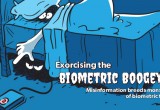Fla. Senator cracks down on biometrics in schools
08 October, 2013
category: Biometrics
Senator Dorothy Hukill (R-Port Orange) has taken a firm stance on the use of biometrics in Florida schools, proposing two separate bills that would both prohibit schools from collecting biometric data of students while also setting policies and procedures for how school districts can create digital records in the future.
The first of the bills, SB 188, would require each school district and superintendent to set guidelines on what form of biometric data may be collected, who administers the data collection, how the biometric data will be stored and who would have access to it. Moreover, in a statement from Senator Hukill, SB 188 stipulates that parents have to opt in to the biometric capture and give permission for their child’s biometric data to be collected and logged.
The second of the bills, SB 232, takes a more aggressive approach to the issue, prohibiting schools from collecting any biometric data from students at all.
The newly proposed bills follow a rather embarrassing fiasco that occurred in the Polk Country school district this past May, when a pilot program with Stanley Convergent Security Solutions scanned the irises of 750 students who use the school’s bus system – without the prior consent of parents. The biometric initiative in Polk County was met with a wave of parent protest, and rightfully so as further investigation of the matter revealed that Stanley personnel were given access to the children without a formal contract in place or apparent knowledge of the interim school superintendent.
Taking a firm stance on the issue, Senator Hukill expresses a clear distaste for the use of biometrics in schools without a comprehensive, and more importantly, clearly defined method of implementation.
“Who would even think a school would take this kind of information from children,” asks Hukill. “We’ve had children get on buses and go through lunch lines for years without taking their biometric information. Why do we need to do this? And if we are going to do this then why not have a policy in effect?”
Neither of the bills have a House companion at this time, but policy will without doubt be a key component in the equation as biometrics technology continues to permeate our daily lives.


